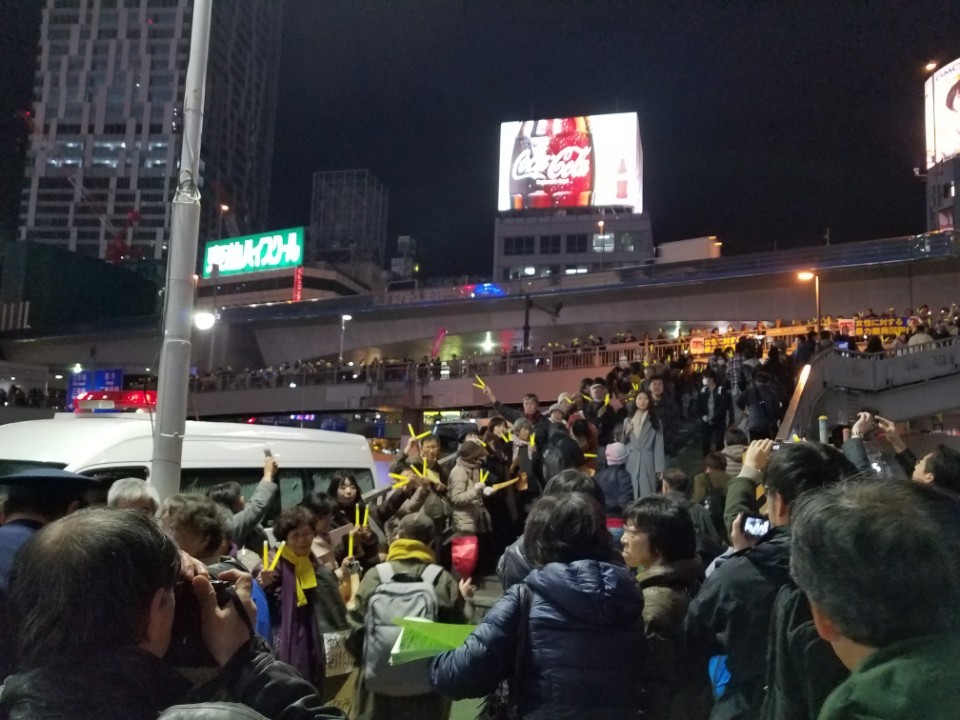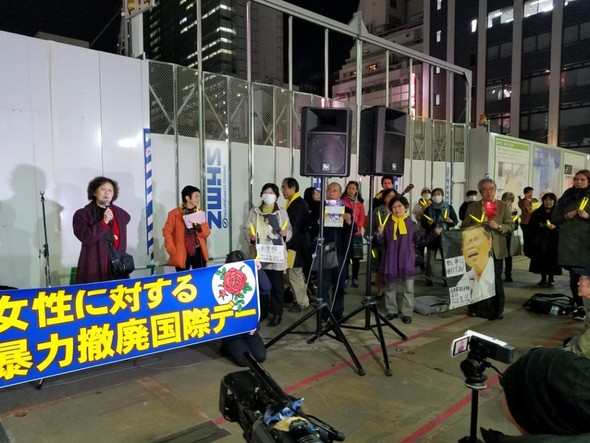Posted on : Nov.27,2017 16:45 KST
 |
|
Japanese civic groups hold a demonstration in the Shibuya neighborhood of Tokyo Nov. 25 to call for an end to sexual violence and a resolution on the military comfort women issue. Demonstrators wave yellow glow symbolizing candles.
|
“The issue wasn’t resolved because the government gave money,” organizers say
“The sexual violence issue isn’t a personal issue. It’s an issue for all of Japanese society. The comfort women issue wasn’t resolved because [the Japanese government] gave some money – people need to confront what kind of issues there were in the past.”
Japanese citizens held a candlelight demonstration in Tokyo’s busy Shibuya neighborhood on the evening of Nov. 25 to call for an end to sexual violence and a resolution on the military comfort women issue. Project Japan Women’s and Human Rights Network co-president Kaori Sato stressed that sexual violence, including the past abuses against comfort women, is a present-day issue for Japanese society in general.
“One out of every 15 Japanese females has suffered sexual violence, and 80% of the victims are children, adolescents, and young women,” Sato said.
The Nov. 25 demonstration was organized by the National Movement for Resolving the Issue of the Japanese Military Comfort Women in honor of the UN-designated International Day to End Violence against Women. The National Movement is an organization with around 50 participating civic groups, including Peace Boat and the Women's Active Museum on War and Peace (WAM). Over 400 citizens attended the demonstration, waving yellow glow sticks representing candles in front of an overpass near Shibuya Station.
 |
|
Japanese citizens speak at a demonstration in the Shibuya neighborhood of Tokyo Nov. 25 to call for an end to sexual violence and a resolution on the military comfort women issue.
|
The march of demonstrators extended beyond the overpass to the other side of the street. The International Day to End Violence against Women was designated in honor of three sisters slain in 1960 while resisting the regime of Rafael Trujillo, a dictatorship that ruled for 31 years in the Dominican Republic.
“The Japanese government has been obstructing the UNESCO registration of archival materials on comfort women from behind the scenes,” said director Eriko Ikeda of WAM, which was involved in a request to have the materials included on the Memory of the World register.
“It goes against global common sense to present mentioning the comfort women issue as somehow ‘anti-Japanese,’” Ikeda said.
National Movement co-director Yoko Shiba said the comfort women issue “has not yet been resolved,” stressing that Seoul and Tokyo’s agreement from Dec. 28, 2015, is “just an agreement between governments.”
“The victims’ voices must not be sealed away,” she said.
“The city of Osaka’s announcement that it plans to sever sisterhood ties with San Francisco after its approval of a comfort women memorial shows the world what the level of Japan’s human rights perceptions is,” Shiba said.
The National Movement argues that the comfort women issue “is a matter of women’s rights, not diplomacy.” Some spoke out against a climate where victims feel unable to mention the sexual violence they have suffered, citing the example of numerous women who are forced to appear in pornographic videos yet accept the blame themselves, claiming it was their “fault for being deceived.” The unfriendly climate for sexual violence victims to speak out was also seen as tied to the Japanese government’s efforts to silence the comfort women issue.
Demonstrators also confessed to feeling worried about attitudes recalling the World War II-era Japanese government’s emphasis on childbirth as a means of achieving prosperity and military strength, citing Liberal Democratic Party lawmaker Akiko Santo’s recent comment that the government should award commendations to women who have four children.
By Cho Ki-weon, Tokyo correspondent
Please direct questions or comments to [english@hani.co.kr]










